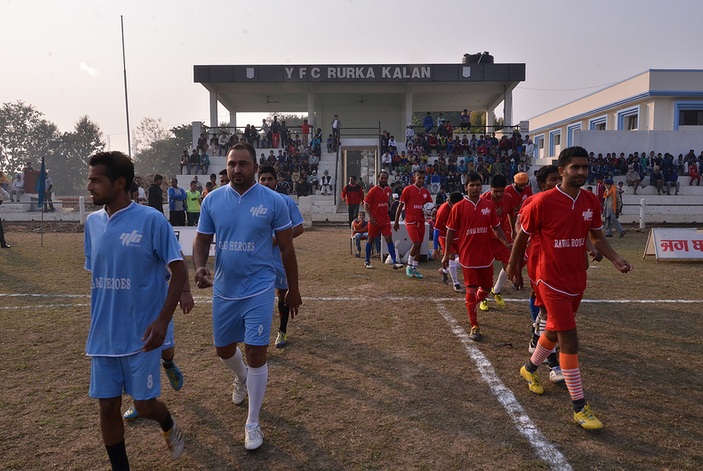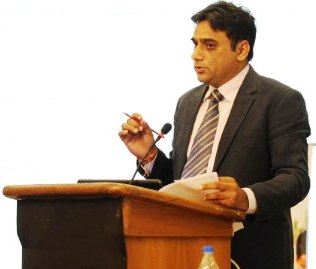It’s the year 2001. The sleepy hamlet of Rurka Kalan, about 40 kilometres from Phagwara in the state of Punjab, is plagued by crime and substance abuse. Almost an entire generation of youth are squandering away their futures. Enter Gurmangal Dass, an electronics engineer, who has returned some years ago from the US after giving up a promising job – a man with a vision for brighter future and a steely resolve to free the village from the clutches of drugs.
Cut to the present – the year 2015. Youth Football Club (YFC) Rurka Kalan now has centres spread across 9 villages in Punjab, touches over 10,000 lives, houses a 5,000 seater sports stadium, operates in the areas of education, sports, health and environment and, amazingly, offers every single service at no cost whatsoever to young people in need.
This is the story of YFC Rurka Kalan – much more than a grassroots football club.
YFC Rurka Kalan’s journey began 14 years ago with nothing but Gurmangal Dass’ hope and will to make things better in his village. He says:
“The boys in this village and our neighbourhood were disillusioned. There were no jobs, they had nowhere to go. Out of frustration, most of them would take to drugs and waste their lives. It was disappointing to watch them while away their time, which could have been used for constructive purposes.”
To deal with the problem, Dass tapped into his passion for football and every Punjabi youth’s inherent love for sport. With the help of locals, Dass coaxed young boys in the village to come and have a kickabout every day. Gradually, the numbers swelled and instead of their next fix of ganja or heroin, young lads would now wait eagerly to perform better at every training session. And this was the genesis of the club.
As time passed, Dass found that some of the boys were extremely talented and, after establishing a basic squad of 15-20 footballers, the team began participating in, and winning, a significant number of local tournaments. Prudently, rather than blowing up cash prizes on celebrations, winnings were deposited into the bank to steadily build a corpus of funds. Most importantly, the villagers were seeing the change in their community. Youth who were earlier whiling away time aimlessly were now motivated to work for something positive. They were becoming healthier, developing good habits and imbibing a sense of discipline into their lives. The village folk invested their meagre earnings to keep their kids off the streets and on the field. Jaswinder, a parent whose son trained at the club said:
“It was literally now or never. We could either help to build up the sport or watch our sons dying. I’m glad we took the former option!”
With the team beginning to perform better, they needed a place to train. Residents of the village helped set up a football ground and two practice pitches by sourcing soil from nearby locations, leveling it, installing an underground irrigation system and laying the turf. In just three days, farmers brought 300 trolleys of soil from a place 20 kilometres away while volunteers toiled hard to level the field and plant grass on it.
Dass speaks further about how the grassroots club went on to grow:
“We went door-to-door to tell the people what we had planned, how we needed them to send their children to play. Their initial response was welcoming and inspiring. In our free time, we used to play in the village ground. Having assessed the enthusiasm of the boys towards the game, I finally decided to go ahead and convert it into an academy. Since we didn’t have a ground back then, we mobilised support and within three to four days, the villagers built it with their bare hands, bringing grass and soil in tractors, turning and setting it, and levelling the field. Even now, the boys help to cut the grass and water it.”
YFC Rurka Kalan then grew from strength to strength. As the club performed better in tournaments and gained mileage in the press, well-wishers came forward from across the world to aid the club and set up better facilities. This enabled the club to establish a fully residential football academy in 2006, a state-of-the-art gymnasium for budding sports talents, a social centre of excellence and, its crown jewel, a sports stadium that seats about 5,000 people along with dressing rooms for the teams – simply astounding for a grassroots football club offering free services, often struggling for funds and entirely dependent on sponsors and donors.
Not content with beating huge odds and incessant challenges, in March 2010, the YFC Rurka Kalan academy boys went on to win the Street Child World Cup Soccer Tournament held in South Africa. They were also runners-up in the Manchester United Premier Cup in Gurgaon in 2011. Between 2010 and 2012, the team consistently finished among the top 3 in the Punjab State Schools Football Championship.
Reflecting on the journey so far, Gurmangal Dass says:
“I couldn’t have done it on my own. The entire village helped make this what it is today.”
From a village dream to a fully-equipped football club that has transformed the destiny of more than 10,000 people, it goes to show what genuine intent and an iron will can achieve. Here’s hoping that we see more YFC Rurka Kalan‘s in every nook and corner of the country.
Kudos to Dr Gurmangal Dass and every single person at YFC Rurka Kalan – may your tribe increase!




Leave a Reply